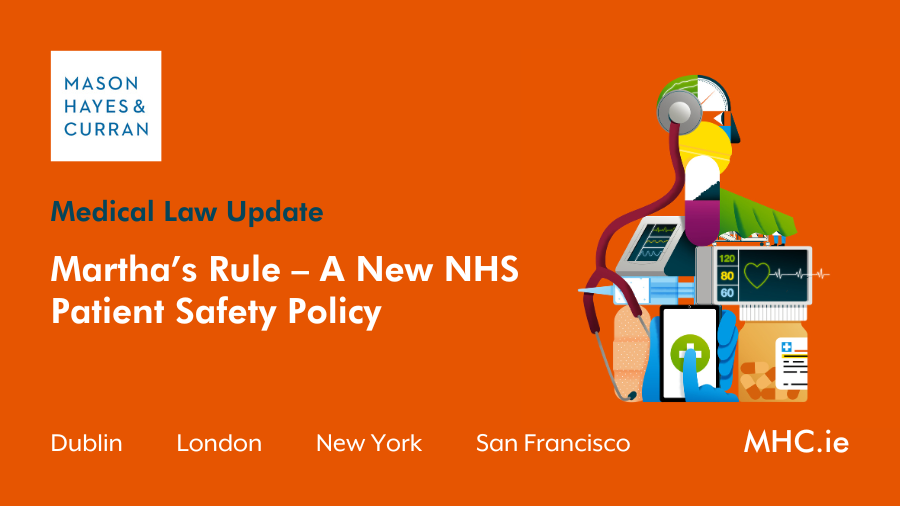Martha’s Rule – A New NHS Patient Safety Policy

Martha’s Rule is a patient safety policy being rolled out in 100 English NHS trusts from April 2024. Patients, families, carers and hospital staff will have round-the-clock access to a rapid review by a separate care team if they are worried about a person’s condition. Our Medical Law team provides a background and summary of this new policy.
Martha Mills was only 13 years old when she sadly passed away in 2021 in King’s College Hospital (King’s) in London. She had a biking accident when on holiday with her family. It later emerged that she had sustained pancreatic damage. Her condition was not believed to be life threatening when she was transferred to King’s, a paediatric pancreatic trauma centre. During her time in King’s, despite her parents raising concerns about her deteriorating condition with staff, Martha developed sepsis. This new policy for access to rapid review for patients has come about as a result of advocacy by Martha’s parents, in an attempt to ensure that similar outcomes are avoided in the future.
Martha’s Rule
The NHS website states that this new funded policy will be adopted through a phased approach. It will begin with at least 100 adult and paediatric acute provider sites which already offer a 24/7 critical care outreach capability. There is no legislative basis for this policy.
There are three elements to the new policy, as per the NHS website, as follows:
- “All staff in NHS trusts must have 24/7 access to a rapid review from a critical care outreach team, who they can contact should they have concerns about a patient.
- All patients, their families, carers, and advocates must also have access to the same 24/7 rapid review from a critical care outreach team, which they can contact via mechanisms advertised around the hospital, and more widely if they are worried about the patient’s condition.
- The NHS must implement a structured approach to obtain information relating to a patient’s condition directly from patients and their families at least daily. In the first instance, this will cover all inpatients in acute and specialist trusts.”[1]
In Irish hospitals, second opinions on patient care are often obtained on a case by case basis. The distinction is that there is no formal system of access to a funded rapid review of patient care in operation in Ireland at present.
Inquest and subsequent events
The inquest into Martha’s death concluded in February 2022. The Coroner found that her medical cause of death was refractory shock, sepsis, pancreatic transection and abdominal trauma. The Coroner raised concerns and prepared a ‘Prevention of Future Deaths report’. In this report, the Coroner found that whilst at King’s, Martha was not promptly referred to the paediatric intensivists. She found that if she had been referred promptly and appropriately treated, the likelihood is that she would have survived her injuries. The Chief Executive of King’s submitted a response including a section agreeing that the escalation of care process needed to be refined and formalised.
Martha’s mother, Merope Mills, is an editor at the Guardian newspaper. She published an article in September 2022 in that paper which was highly critical of the care provided to her daughter. She listed the series of errors which she believed had led to her daughter’s premature death. Following this, Merope was contacted by the think tank Demos. Demos published a report in September 2023 proposing Martha’s Rule. The Rule was proposed to “rebalance the power between patients and medics with one purpose only: to improve patient safety.” The Rule was based on several pre-existing models of rapid care review.
International patient safety models
- In Australia, the health system in the state of Queensland developed Ryan’s Rule. This followed the death of Ryan Saunders in 2007 from an undiagnosed streptococcal infection, which led to toxic shock syndrome. Similarly to Martha’s case, Ryan’s parents had concerns that he was deteriorating and did not feel the clinicians acted expeditiously. In this Queensland system, patients or families call a dedicated phone number advertised in the hospital and ask for a Ryan’s Rule Review. A Ryan’s Rule nurse will then come and assist.
- The University of Pittsburgh has a system called Condition H(elp). Patients and relatives call an in-hospital number and a rapid response review team will attend.
- Closer to home, an NHS trust in Berkshire, England, already operated a Call 4 Concern model. Patients and their families can contact an in-hospital critical care outreach team if they have concerns about their own condition or a loved one’s condition.
The Demos report states that evaluations of the above three systems have been positive. There is no evidence of overuse or abuse of the system.
The English health secretary announced that the government would be committing to bringing in the proposed Martha’s Rule in September 2023. The head of the NHS confirmed that Martha’s Rule will be rolled out in English hospitals from April 2024.
Conclusion
Questions remain as to how exactly Martha’s Rule will operate on a day to day basis. On a practical level, it will be colleagues of the treating clinicians who will carry out the review. There has been some criticism from clinicians regarding the ambiguity of the Rule and the framing of access to a review team as a ‘right’.[2] Despite the criticisms, Martha’s Rule has the potential to amplify concerns regarding patient care, thereby improving patient safety. We will watch with interest as Martha’s Rule is implemented in England. It remains to be seen if a similar approach is adopted elsewhere.
For more information and expert legal advice, contact a member of our Medical Law or Healthcare teams.
People also ask
Is there a formal system in Ireland to access a funded rapid review of a patient’s care? |
In Irish hospitals, second opinions on patient care are often obtained on a case by case basis. There is no formal system of access to a funded rapid review of patient care in operation in Ireland at present. |
What is Martha’s Rule? |
Martha’s Rule is a new patient safety policy being introduced in English NHS trusts from April 2024. It aims to provide funded access to rapid review of patient care at the request of patients, families or hospital staff who have concerns. |
The content of this article is provided for information purposes only and does not constitute legal or other advice.
Share this:


